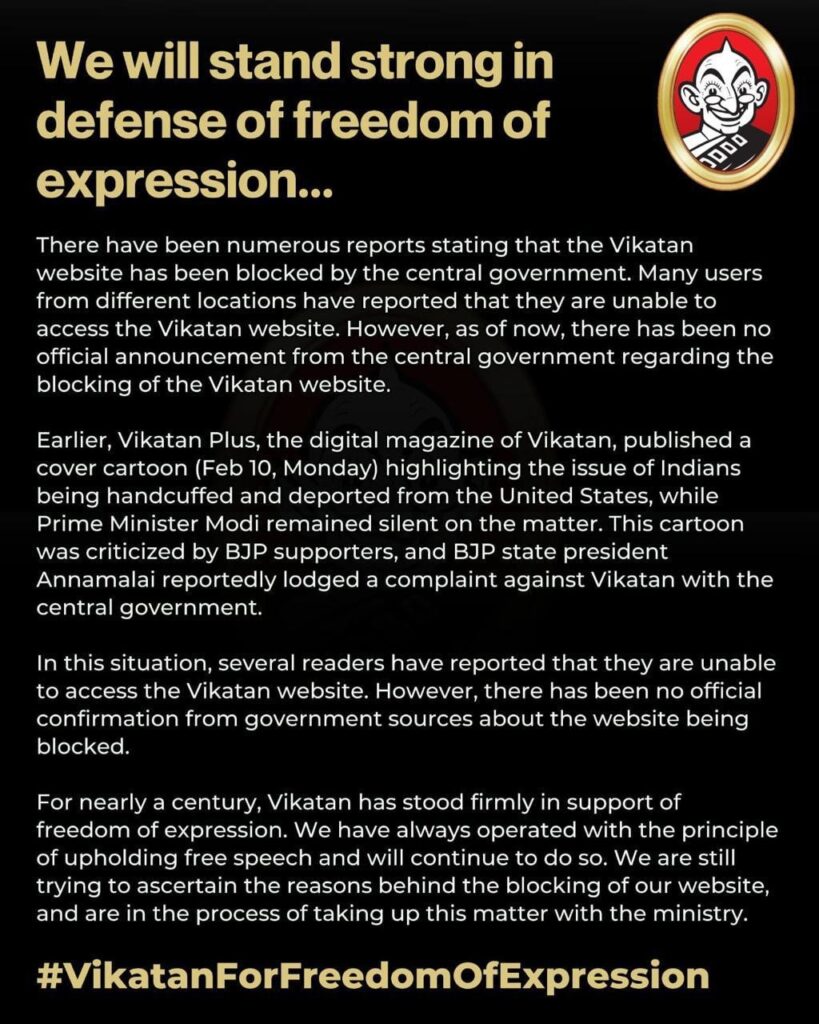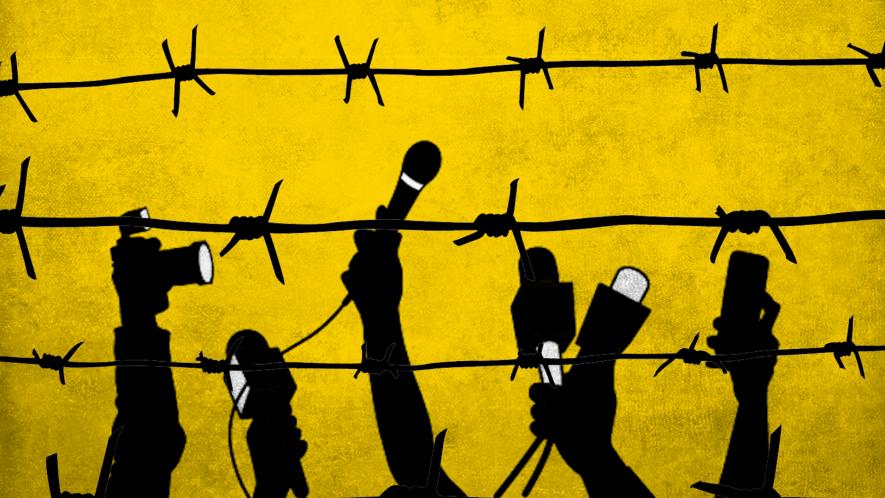The sudden and unexplained blocking of Vikatan’s website has sparked widespread outrage over the state of press freedom in India. As one of Tamil Nadu’s most respected media houses, Vikatan has built a reputation for fearless journalism. However, its abrupt restriction—without prior warning or official justification—appears to be a targeted attempt to silence dissent. The move comes after the publication of a political cartoon depicting Prime Minister Narendra Modi with chained hands and legs, sitting before former US President Donald Trump. The image, a sharp critique of Modi’s perceived subservience to Trump, has raised serious concerns about the government’s increasing intolerance towards independent media. The blocking took place on Sunday, February 16.
BJP’s political vendetta against Vikatan
Reports indicate that BJP leaders in Tamil Nadu were incensed by the cartoon, which they viewed as an affront to Modi’s image. The illustration mocked Modi’s election strategy and his alignment with Trump’s brand of right-wing populism, implying that Modi was constrained in his dealings with the United States. Rather than countering criticism through debate, BJP members allegedly pressured authorities to act against the publication. This follows a well-documented pattern where media outlets, journalists, and activists critical of the ruling party are subjected to intimidation, legal harassment, and outright suppression. Many have argued that the BJP is using state machinery to muzzle dissent, reinforcing India’s drift towards authoritarianism under Modi’s leadership.
The shadowy mechanisms of censorship
What makes the Vikatan episode particularly concerning is the sheer opacity surrounding the takedown. There has been no official court order, no government notification, and no clear legal basis for the restriction. Instead, it appears that the government has resorted to vague, extra-legal means—perhaps through arbitrary applications of the Information Technology Act, 2000—to justify its actions of blocking the website. The lack of transparency raises troubling questions about whether the state is deliberately avoiding legal scrutiny by bypassing due process. This incident sets a precedent where any dissenting media outlet could be silenced overnight, with no accountability from the authorities.
In response to the arbitrary censorship, Vikatan has strongly condemned the government’s actions, calling them “an unprecedented attack on press freedom.” The publication released a statement asserting that it had merely exercised its journalistic duty to critique those in power and that such intimidation tactics would not deter it from reporting the truth. “Democracy thrives on dialogue and dissent. Silencing independent voices is a dangerous precedent that threatens the very foundations of free speech,” the statement read. Vikatan further demanded a formal explanation for the takedown and vowed to pursue legal remedies if necessary. The publication also received widespread solidarity from journalists, media watchdogs, and press organisations, all of whom view this as a blatant attempt to curb independent reporting.

T Murugan, the editor of the magazine, defended the cartoon as a legitimate form of criticism and a symbol of democratic dissent, stating that the magazine will not surrender its freedom in the face of such threats and intimidation. He clarified that there was no official directive to block the website, describing the action as unofficial. According to Murugan, the magazine’s management believes that service providers like Airtel and Jio were likely pressured into restricting access to the site, which was blocked around 7 pm on Saturday. He also noted that the magazine, which has championed free speech for nearly a century, is currently seeking clarification from the Union government regarding the reasons for the restriction.
Political leaders condemn the move
Opposition leaders, press freedom advocates, and civil society groups have strongly condemned the censorship of Vikatan. Congress MP Rahul Gandhi criticised the action as “yet another desperate attempt by the Modi government to suppress dissenting voices,” emphasising that “the BJP is dismantling democracy piece by piece.” DMK leader and Tamil Nadu Chief Minister M.K. Stalin called the move “a brazen assault on press freedom,” highlighting that “Vikatan’s fearless journalism has always been a voice of the people—silencing it is an attack on democratic values.”
Viduthalai Chiruthaigal Katchi (VCK), a prominent political party in Tamil Nadu, described the government’s action as a “fascist tendency” that reveals an intolerance toward legitimate criticism. Journalists’ collectives including the Chennai Press Club and civil rights organisations have also decried the move, warning that it represents a dangerous precedent where political pressure can dictate government censorship of the media. Ram further emphasised the unprecedented nature of the digital blockade: “This is not a simple blocking move. By degrading and preventing access to digital news content through non-transparent ‘dirty tricks’ technical manoeuvres, it subverts media freedom and reader’s right to information. This arbitrary action, utterly devoid of legality, has wide implications for the media sector.”
Ram added that on February 16, after technical censorship had been set in motion and the damage had been done, the Ministry of Information and Broadcasting sent a notice to the Vikatan group.
As per the information provided by Ram, the said notice states that the ministry had “received a request for blocking of certain content” published at a website affiliated with Vikatan; that a “meeting of the Inter-Departmental Committee constituted under the Information Technology (Intermediary Guidelines and Digital Media Ethics Code) Rules, 2021” was scheduled for February 17; and that Vikatan could “appear and submit its comments/clarifications, if any, before the Committee.”
Ram commented that it was a case of “Sentence first, verdict afterwards” – a reference to the impatient declaration by the Queen of Hearts in Alice’s Adventures in Wonderland.
Even former BJP ally and AIADMK leader O. Panneerselvam distanced himself from the censorship, stating that “freedom of the press is non-negotiable, and actions like these only strengthen the perception that the BJP is intolerant of criticism.” Despite this outcry, the central government has refused to issue a statement, reinforcing suspicions that it orchestrated the takedown but wants to avoid public accountability.
A history of suppression: Vikatan and beyond
This is not the first time Vikatan has faced political retribution for its reporting. In 1987, the magazine’s editor was arrested for publishing material critical of the government, reflecting a long history of state-driven intimidation against independent media. However, under the Modi government, such suppression has escalated to an unprecedented level. Independent journalists have been arrested, digital media platforms have been raided, and news organisations critical of the BJP have faced financial and legal crackdowns. The broader trend is clear: press freedom in India is under siege.
The implications for Indian media
Vikatan’s ordeal is a warning to all media houses in India: no outlet is safe from government retaliation. The chilling effect is already evident, with many journalists and editors choosing self-censorship over the risk of shutdowns, arrests, or financial ruin. If this trajectory continues unchecked, India’s press will be reduced to little more than a government mouthpiece. The international community has already noted this decline—India has plummeted in global press freedom rankings, with watchdog organisations repeatedly raising concerns over the state’s hostility toward independent journalism.
The Vikatan controversy serves as a litmus test for India’s democratic resilience. Press organisations, journalists, and civil society must push back forcefully, demanding explanations and legal clarity from the government. The Editors Guild of India, Reporters without Borders, and other advocacy groups have decried the censorship, but strong words alone will not suffice. If this case fades into silence, it will embolden the government to act with even greater impunity in the future.
The question remains: Will India’s media fraternity and civil society take a stand, or will silence become the new normal?
Related:
Gateway to Censorship: caution and concern over the proposed Broadcasting Bill, 2023

